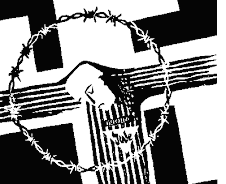
Una de las anécdotas más divertidas y reveladoras de la Revolución Cultural china fue que cuando cientos de miles de jóvenes inspirados inundaban Pekín en 1966, se encontraron con que cada contingente llevaba insignias de algodón que denotaban su ciudad, pero que algunas insignias eran más escasas y por tanto más raras que otras. Inmediata y espontáneamente surgió un mercado en el que se comerciaba con las insignias y había descuentos. Los orgullosos jóvenes se jactaban de llevar las insignias escasas que pudieron conseguir mediante el intercambio mientas se manifestaban contra la restauración del capitalismo y a favor de la revolución cultural.
Red Guard: The Political Biography of Dai Msiau-ai (New York, 1971).
Menos mal que el inefable xalisko, uno de mis últimos y más apasionados admiradores (menos retórica y más acción, guapo) no estaba por ahí, porque no habría dejado a ninguno de esos pervertidos vivo. Además de ofrecerme para una blind hot date, le recomiendo un interesantísimo libro de Mercedes Rosúa, Diario de China (Unisón, 2003) escrito gracias a una generosa beca de la CIA y del Mosad.
Como me dijo una vez una loca divertidísima que trabajaba con Karl Legerfeld, el admirador de la bandera americana ("si no fuera por ella hoy todos viviríamos en alguna granja nazi o soviética"), si a algún gilipuertas se le ocurriera abolir el capitalismo hoy, alguien más lo inventaría mañana.








3 comments:
¡Qué público tan soso tengo! Cientos de visitas y ni un comentario. Bueno, os dejo el que me ha hecho un tal Curro en un post similar que he colgado en mi blog del Telegraph. Está visto que aquí o insultas a alguien o no te comenta ni tu mamá:
The market flourishes anywhere, as soon as it is given a chance. Even in the crevices of totalitarian systems. A rather depressing realization for the socialists. Lenin had to admit it in 1921, when he established the NEP, thus abandoning the original -purely socialist- economic system the Soviets had imposed. And Primo Levi explains in detail (in his Auschwitz memoirs: "If this is a man") how a primitive market thrived in the most oppressive environment thinkable (the concentration camp): cigarrettes were the currency unit, shirts were traded against crumbs of bread, there was even a "stocks exchange", etc. The Jews from Salonika (Spanish-speakers, by the way: you know, Sefardites) were particularly skilled for this traffic.
a algunos les gustaría vivir en una granja soviética.
Gracias, Jorge, you make my day :))
Post a Comment